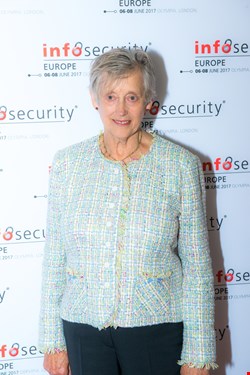Dame Stella Rimmington was the first female director general of MI5 and the first DG whose name was published on appointment. She talks to Eleanor Dallaway about diversity, transparency, Judy Dench and how, through literature, she brought to life her alter ego, Liz Carlyle...
Do you think that the evolution in technology plays more into the hands of our defense services, or more into the hands of the attackers?
Keeping pace with technology changes and means of communication is one of the great tasks for the intelligence services. It’s not only keeping pace with technology, but it’s also the law keeping pace with technology. Our intelligence services obviously have to work within the law, and if the law is behind technology, then you get into the kind of difficulties that we saw after the Snowden revelations. I don’t know who technology is helping more, but I sense that the attackers are able to move more quickly in employing all the new technologies than our defense services can in combatting them, for all the reasons above, including the issue around legislation.

The new National Cyber Security Centre (NCSC), part of GCHQ, is very much transparent. Do you think this is a positive thing and what are the challenges that come with that?
It is purely a positive thing. GCHQ’s other work is still going on covertly, and NCSC is an open unit designed to help companies, government departments and people who are vulnerable to hacking. Hacking has now become a political tool for those who want to undermine democratic countries, and you’ve only got to look at the whole furor that’s going on in the United States about whether or not the Russians interfered with their election. Hacking is now a tool of those who want to undermine the UK, the West, Europe and undermine democracy in general.
You were the first female director general of MI5. Twenty-five years later, do you think enough progress has been made in terms of diversity?
In terms of statistics, we haven’t made progress. It may be that we’re still living in the world of boys’ toys, and this business just being of more interest in general to blokes. I don’t see why it should be, however, because it’s very much an up-and-coming area, and this industry needs diversity of approach and diversity of personality. The industry needs to make itself more attractive, by making the recruitment less geared to blokes. I faced a greater challenge because I was a woman in that role. When I joined, men ran the place and women were just ‘nice little helpers’. They questioned my promotion and why I got that job. Now, I’m quite sure that there’s none of that, because there have been two female director generals, and there will be more women up at the top before long. Terrorists come in all shapes and sizes, as do spies, so you need all shapes and sizes to defeat them. If you’re dealing with the world outside, then you’ve got to represent it.
Hacking is now a tool of those who want to undermine the UK, the West, Europe and undermine democracy in general.
It’s widely known that you were the inspiration behind the character ‘M’ in the James Bond book and film series. Are you pleased with that portrayal?
Yes. Judy Dench is a very, very good actress. She became M a couple of years after I became director general and she looked exactly like I looked in those days, even down to the clothes I used to wear, so that was very flattering. I followed her career with great interest actually and like me, she suffers from macular degeneration. We’re both almost exactly the same age and she is still working all the time, so she’s a role model for me.
If you could have your time as director general again, would you choose to do it in the era that you did it in (1992-1996) or the era that we’re in today?
That’s a difficult question. The fascination of this era, and the difficulty of the issues, is very appealing to somebody who likes to get stuck in, so in a way it’s slightly frustrating being on the outside. However, it is a very difficult thing they’ve got to do and the horror of all these mass attacks on members of the general public and kids at a pop concert…it’s so awful that who would actually want to be responsible for that? There is a fascination and a challenge in it, but even in my advancing years, I wouldn’t mind getting stuck in.
Tell us about your Liz Carlyle book series…
I’d always wanted to write a thriller and I used to think about it when I was in service, because I’ve always been a reader of spy stories, police dramas, detective stories and all that stuff. It occurred to me that all the heroes are men and I wanted to write a thriller that had a female lead character. When I finished working, the first thing I did was write my autobiography, which I’d never intended to write at all. I then created Liz Carlyle, who is sort of an alter ego of myself, but a modern version. She gives me an opportunity to say and do all sorts of things. I would have liked to have said and done when I was 35. These books are a fulfilment of an ambition and an enjoyment for me.
